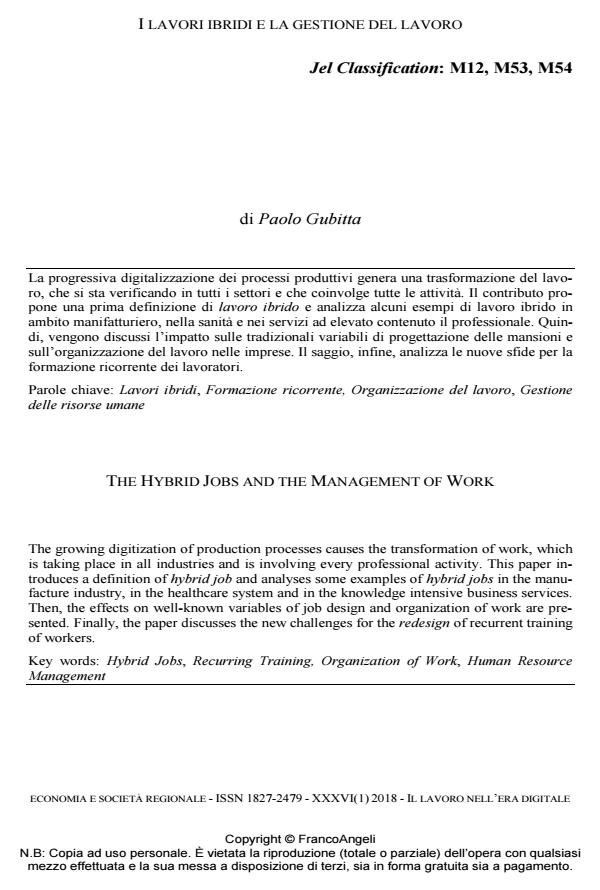The hybrid jobs and the management of work
Journal title ECONOMIA E SOCIETÀ REGIONALE
Author/s Paolo Gubitta
Publishing Year 2018 Issue 2018/1
Language Italian Pages 13 P. 70-82 File size 351 KB
DOI 10.3280/ES2018-001006
DOI is like a bar code for intellectual property: to have more infomation
click here
Below, you can see the article first page
If you want to buy this article in PDF format, you can do it, following the instructions to buy download credits

FrancoAngeli is member of Publishers International Linking Association, Inc (PILA), a not-for-profit association which run the CrossRef service enabling links to and from online scholarly content.
The growing digitization of production processes causes the transformation of work, which is taking place in all industries and is involving every professional activity. This paper introduces a definition of hybrid job and analyses some examples of hybrid jobs in the manufacture industry, in the healthcare system and in the knowledge intensive business services. Then, the effects on well-known variables of job design and organization of work are presented. Finally, the paper discusses the new challenges for the redesign of recurrent training of workers.
Keywords: Hybrid Jobs, Recurring Training, Organization of Work, Human Resource Management
Jel codes: M12, M53, M54
- Albertini S., Gubitta P. (2018). Preface. In: Cantoni F., Mangia G., eds. (2018). Human Resource Management and Digitalization. Torino: Giappichelli Routledge.
- Aoun J.E. (2016). Hybrid Jobs Call for Hybrid Education. The Economist, April 12.
- Autor D.H. (2015). Why Are There Still So Many Jobs? The History and Future of Workplace Automation. The Journal of Economic Perspectives, 29(3): 3-30,
- Barley S.R., Bechky B.A., Milliken F.J. (2017). The Changing Nature of Work: Careers, Identities, and Work Lives in the 21st Century. Academy of Management Discoveries, 3(2): 111-115,
- Brynjolfsson E., McAfee A. (2014). The Second Machine Age: Work, Progress, and Prosperity in a Time of Brilliant Technologies. New York: W.W. Norton & Company.
- Bughin J., Lund S., Remes J. (2017). Ten New Work Orthodoxies for the Second Machine Age. In: Lanvin B., Evans P., eds. The Global Talent Competitiveness Index. Talent and Technology, ch. 3 -- <https://www.insead.edu/sites/default/files/assets/dept/globalindices/docs/GTCI-2017-report.pdf>.
- Bussolaro A., Foffano S. (2012). Lo spazio delle norme. Presente e futuro del diritto del lavoro. economia e società regionale, 116(2): 56-70, DOI: 10.3280/ES2012-002005
- Cantoni F., Mangia G., eds. (2018). Human Resource Management and Digitalization. Torino: Giappichelli Routledge.
- Carboni C. (2016). Lavoro ed evoluzione tecnologica. La rivista il Mulino, 65(2): 346-354, DOI: 10.1402/82851
- Cerri M. (2012). Elementi per una storia critica del lavoro sociale. economia e società regionale, 116(2): 71-82, DOI: 10.3280/ES2012-002006
- Colbert A., Yee N., George G. (2016). The Digital Workforce and the Workplace of the Future. Academy of Management Journal, 59(3): 731-739,
- Costa G., Gianecchini M. (2015). Risorse Umane. Persone, relazioni, valore. Milano: McGraw-Hill.
- Costa G., Gubitta P., Pittino D. (2014). Organizzazione aziendale: mercati, gerarchie e convenzioni. Milano: McGraw-Hill.
- Edwards R., Fenwick T. (2016). Digital Analytics in Professional Work and Learning. Studies in Continuing Education, 38(2): 213-227, DOI: 10.1080/0158037X.2015.1074894
- Ford M. (2015). Rise of the Robots: Technology and the Threat of a Jobless Future.
- New York: Basic Books. Tr. it. (2017). Il futuro senza lavoro. Accelerazione tecnologica e macchine intelligenti. Come prepararsi alla rivoluzione economica in arrivo. Milano: Il Saggiatore.
- Frey C.B., Osborne M.A. (2017). The Future of Employment: how Susceptible are Jobs to Computerisation?. Technological Forecasting and Social Change, 114, January: 254-280,
- Gosetti G. (2012). La dilatazione del tempo compresso. Elementi per un quadro analitico della qualità della vita lavorativa. economia e società regionale, 116(2): 38-55,
- Gubitta P. (2012). Il ruolo dell’imprenditore nell’era dell’accesso. economia e società regionale, 2: 7-22, DOI: 10.3280/ES2012-002002
- Gubitta P. (2015). La doppia polarizzazione del lavoro. Harvard Business Review - Edizione italiana, luglio-agosto, 46, -- <http://www.aidp.it/aidp_be/ALLEGATI/RS/Pag-46_Gubitta.pdf>.
- Gubitta P. (2017). La corsa ad ostacoli dei lavori ibridi: ecco l’operaio 4.0. Gli stati generali, 22 agosto.
- Gubitta P., Masino G. (2012). Introduzione: perché riflettere sulle trasformazioni del lavoro. economia e società regionale, 116(2): 5-22, DOI: 10.3280/ES2012-002001
- Horton J., Kerr W.R., Stanton C. 2017. Digital Labor Markets and Global Talent Flows. National Bureau of Economic Research (NBER), WP n. 23398.
- Kunze F., Menges J.I. (2017). Younger Supervisors, Older Subordinates: An Organizational‐level Study of Age Differences, Emotions, and Performance. Journal of Organizational Behavior, 38(4): 461-486,
- Manyika J., Spencer M. (2018). The False Choice Between Automation and Jobs. Harvard Business Review, February 5 -- <https://hbr.org/2018/02/the-falsechoice-between-automation-and-jobs>.
- Masino G., Berdicchia D. (2012). Il tempo e le trasformazioni del lavoro. Economia e società regionale, 116(2): 23-37, DOI: 10.3280/ES2012-002003
- Mazmanian M., Orlikowski W.J., Yates J. (2013). The Autonomy Paradox: The Implications of Mobile Email Devices for Knowledge Professionals. Organization Science, 24: 1337-1357,
- Rebora G. (2017). Scienza dell’organizzazione: il design di strutture, processi e ruoli. Roma: Carocci.
- Soule D.L., Puram A.D., Westerman G.F., Bonnet D. (2016). Becoming a Digital Organization: The Journey to Digital Dexterity. SSRN WP #301,
- Do Machines Dream of Electric Workers? Martina Gianecchini, Sara Dotto, Paolo Gubitta, pp.67 (ISBN:978-3-030-83320-6)
- Employability and Industrial Mutations Martina Gianecchini, Paolo Gubitta, Sara Dotto, pp.85 (ISBN:9781786307439)
- Time-Space Patterns in Work and Organizing: Setting the Scene, Taking Stock and Moving Forward Sonia Bertolini, Anna Carreri, Dawn Lyon, Lia Tirabeni, in STUDI ORGANIZZATIVI 2/2025 pp.7
DOI: 10.3280/SO2025-002001
Paolo Gubitta, I lavori ibridi e la gestione del lavoro in "ECONOMIA E SOCIETÀ REGIONALE " 1/2018, pp 70-82, DOI: 10.3280/ES2018-001006